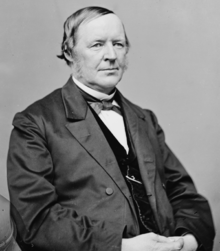Hugh McCulloch | |
|---|---|
 | |
| 27th and 36th United States Secretary of the Treasury | |
| In office October 31, 1884 – March 7, 1885 | |
| President | Chester A. Arthur |
| Preceded by | Walter Q. Gresham |
| Succeeded by | Daniel Manning |
| In office March 9, 1865 – March 3, 1869 | |
| President | Abraham Lincoln Andrew Johnson |
| Preceded by | William P. Fessenden |
| Succeeded by | George S. Boutwell |
| Comptroller of the Currency | |
| In office February 25, 1863 – March 9, 1865 | |
| President | Abraham Lincoln |
| Preceded by | Position established |
| Succeeded by | Freeman Clarke |
| Personal details | |
| Born | December 7, 1808 Kennebunk, Maine, U.S. |
| Died | May 24, 1895 (aged 86) Prince George's County, Maryland, U.S. |
| Political party | Republican |
| Residence | Hugh McCulloch House |
| Education | Bowdoin College |
| Signature | |
Hugh McCulloch (December 7, 1808 – May 24, 1895) was an American financier who played a central role in financing the American Civil War. He served two non-consecutive terms as U.S. Treasury Secretary under three presidents. He was originally opposed to the creation of a system of national banks, but his reputation as head of the Bank of Indiana from 1857 to 1863 persuaded the Treasury to bring him in to supervise the new system as Comptroller of the Currency 1863–1865. As Secretary of the Treasury 1865–1869 he reduced and funded the gigantic Civil War debt of the union, and reestablished the federal taxation system across the former Confederate States of America. He tried but failed to make a rapid return to the gold standard.
He was the last surviving member of the Lincoln Cabinet.